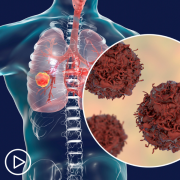In-Depth Testing for Lung Cancer Prognosis and Treatment
In-Depth Testing for Lung Cancer Prognosis and Treatment from Patient Empowerment Network on Vimeo.
How is in-depth lung cancer testing used in determining lung cancer prognosis and treatment? Expert Dr. Heather Wakelee shares insight about biomarker testing, genomic testing, and how test results may impact treatment options.
Dr. Heather Wakelee is a thoracic medical oncologist and deputy director of the Stanford Cancer Institute where she also serves as the division chief of medical oncology. Learn more about Dr. Wakelee, here.
See More From INSIST! Lung Cancer
Related Programs:

|

What Are Biomarkers and How Do They Impact Lung Cancer Treatment Options? |

How Are Targeted Therapy and Immunotherapy Used in Lung Cancer Care? |
Transcript:
Katherine:
Dr. Wakelee, but what is genomic or biomarker testing?
Dr. Wakelee:
So, we are struggling with how to have one unifying way of describing it because it’s so complicated. So, to me, biomarker testing is any aspect of the tumor that helps us choose the best treatment for that patient. And so, it’s a very broad term. And, within biomarker testing, there are several different ways that we look at it.
So, one is to look at what proteins are on the cell’s surface. And, we do that by having stains that we use to stain the tissue. So again, complicated, but when a piece of tissue is taken out of the person, part of the tumor is removed. It’s sliced into little tiny slices, which are then put on glass slides that can be looked at under the microscope. And, that’s how the pathology doctors can look and see, “Ah, this looks like cancer,” or, “It doesn’t look like cancer.” When it does look like cancer, you can then put on stains, so basically, different colored antibodies that will light up if that particular protein is there. And so, that helps us figure out for sure that this started in the lung because there are specific proteins that are only found in lung. So, that’s one way we used it, and this is an older technology. But we also can use that to look for how much of this PD-L1 protein is expressed.
And so, that’s an important biomarker, but it’s not based on genomics, which is when we’re talking about the DNA.
Then, we have the genomic testing, and that’s when we’re looking at the genome of the tumor and how that genome is different. And, that’s that DNA or RNA testing. We talk about it with the next-gen sequencing. So, “sequencing,” any of those terms are all meaning we’re looking at some aspect of what makes the tumor genes and therefore the proteins made by the tumor different than the rest of the genes in the person.
And so, that testing, that genomic testing can be done on either the tumor specimen or that’s where we can do blood tests that will be able to pull out those bits of the DNA that are from the tumor versus from the person and help us figure out what’s going on with the cancer. So, when we talk about biomarkers, the whole picture, and when I’m talking with patients who are diagnosed with lung cancer, we talk about well, there’s chemotherapy treatment, which is good for almost everybody. There is targeted therapy.
Targeted therapy is usually based on those genomic tests, and the genomic tests can be done either on the tissue or on blood. But, they’re really important to have a full understanding of the
tumors to do a comprehensive or next-gen sequencing analysis of the tumor or DNA. And then, you have the immune therapy where that PD-L1 biomarker is important. So, that’s the way I think about it, and the biomarkers are really critical for helping us figure out what’s the best path forward for any individual patient.
When I started treating lung cancer patients 20 years ago, we only had chemotherapy. And now, for metastatic disease, with using the right biomarkers, we can figure out so much more about the cancer to be able to personalize the treatment, for many patients, being able to offer pill therapies that are somewhat less toxic and highly active and give people more time. And now, we’re in the immune therapy revolution, which is helping a whole other group of patients living with lung cancer to be able to live with quality life for much longer. And the pace of discovery is just going up so quickly. And, I think that’s what I’m most hopeful about is just how much attention is being paid on lung cancer and finding better therapies that are going to help more people for a longer period of time.










